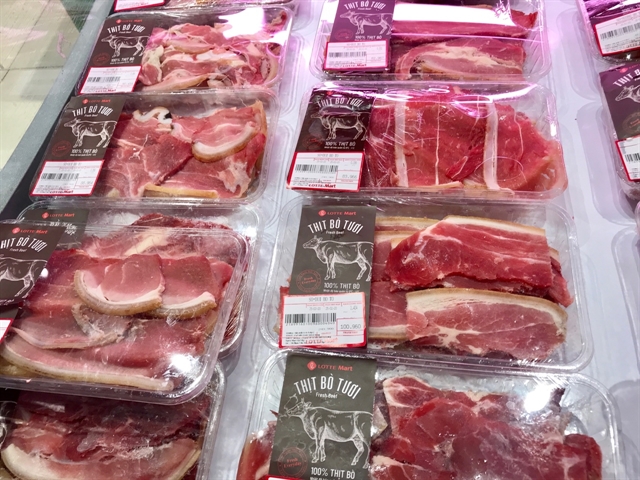 Economy
Economy


|
| In the first 11 months of the year, Việt Nam imported $556 billion worth of cows and buffalos for meat slaughtering. – Photo: vietnambiz.vn |
HCM City – Việt Nam imported 70 per cent of its beef this year, with domestic beef accounting for only 30 per cent of the market.
Tống Xuân Chinh, deputy head of the Animal Husbandry Department under the Ministry of Agriculture and Rural Development, said that Việt Nam imported 517,904 buffalos and cows for meat slaughtering (91.5 per cent of which were cows) in the first 11 months of this year, worth more than US$556 million.
In the same period, the country spent more than $295 million for 80,124 tonnes of frozen beef and buffalo meat.
For the chilled meat segment, the import volume was limited. More than 1,546 tonnes of chilled meat were imported from 10 countries in the first 11 months of the year, worth $15.7 million.
According to the Organisation for Economic Cooperation and Development (OECD) and the Food and Agriculture Organization of the United Nations (FAO), beef consumption in Việt Nam in the 2017-19 period averaged 9.2 kilos per person per year.
However, domestic beef production met only 30 per cent of demand.
In 2020, Việt Nam had 6.24 million cows, equivalent to 372,500 tonnes of meat, a year-on-year increase of 4.8 per cent, Chinh said.
Thanks to new technologies and support from the government, the industry is set to achieve an output of 600,000 tonnes of cattle meat, mainly beef, by 2030.
The country also has many cattle farms, with a capacity of up to thousands of heads, located in Hà Nội, Hòa Bình, Hà Tĩnh, Gia Lai, Đồng Nai, and Tây Ninh.
To ensure animal welfare, Vietnamese firms fatten imported Australian cows and sell to domestic slaughterhouses in line with the exporter supply chain assurance system (EVAS).
Fifty businesses and 90 slaughterhouses in Việt Nam have been certified by the Australian Department of Agriculture and Water Resources. – VNS




